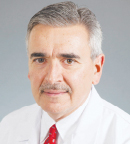In a study presented at the 2020 San Antonio Breast Cancer Symposium (Abstract GS4-10) and concurrently published in the Journal of Clinical Oncology, Joseph A. Sparano, MD, and colleagues described the development and validation of a new prognostic tool. RSClin integrates the 21-gene recurrence score and clinical-pathologic factors to allow for the creation of individualized estimates of risk for distant disease recurrence and prediction of risk-reduction benefit of adjuvant chemotherapy in patients with early breast cancer.

Joseph A. Sparano, MD
Study Details
The RSClin tool, which integrates recurrence score with tumor grade, tumor size, and age, was developed using data from a patient-specific meta-analysis including 10,004 women with hormone receptor–positive, HER2-negative, node-negative breast cancer who received endocrine therapy alone in the B-14 (n = 5,577) and TAILORx (arms A and B, n = 4,854) trials or with chemotherapy in TAILORx (arms C and D, n = 4,573).
Models for RSClin were compared with recurrence score alone and clinical-pathologic features alone using likelihood ratio tests. RSClin estimates of distant disease recurrence were generated using baseline risk with TAILORx event rates to reflect current medical practice. A patient-specific estimator of absolute chemotherapy benefit in risk reduction was derived from individualized relative chemotherapy effects observed in the TAILORx and B-20 trials. Risk estimation was externally validated by comparing RSClin with observed risk among 1,098 women in the "real-world" Clalit Health Services registry, which included 876 patients receiving endocrine therapy alone and 222 receiving chemotherapy.
Key Findings
Among all 10,004 patients in the meta-analysis cohort, RSClin provided more prognostic information for distant recurrence vs recurrence score alone (difference in likelihood ratio χ2 = 122.5, P < .001, likelihood ratio test) or a model using clinical-pathologic factors alone (difference in likelihood ratio χ2 = 86.2, P < .001, likelihood ratio test).
“The RSClin tool integrates clinical-pathological and genomic risk to guide adjuvant chemotherapy in node-negative breast cancer and provides more individualized information than clinical-pathological or genomic data alone.”— Joseph A. Sparano, MD, and colleagues
Tweet this quote
In external validation in the Clalit registry, RSClin risk estimates were significantly associated with an observed risk of distant disease recurrence (standardized hazard ratio = 1.73, P <.001). Within each risk quantile, the average 10-year risk estimate by RSClin approximated the Kaplan-Meier estimate in the cohort, with a Lin concordance correlation of 0.962. RSClin provided more prognostic information than either recurrence score alone (P = .004, likelihood ratio test) or clinical-pathologic factors alone (P = .027, likelihood ratio test).
Use of the novel patient-specific estimator of chemotherapy benefit showed that for a 55-year-old woman with a clinical low-risk 1.5-cm intermediate-grade tumor, the estimate of absolute chemotherapy benefit in risk reduction ranged from 0% to 15%, as the recurrence score ranged from 11 to 50. Over the same recurrence score range for a 55-year-old woman with a clinical high-risk 2.5-cm poor-grade tumor, the absolute chemotherapy benefit estimate ranged from 1% to 33%.
The investigators concluded: “The RSClin tool integrates clinical-pathological and genomic risk to guide adjuvant chemotherapy in node-negative breast cancer and provides more individualized information than clinical-pathological or genomic data alone.”
Dr. Sparano, of Montefiore Medical Center, Albert Einstein College of Medicine, is the corresponding author of the Journal of Clinical Oncology article.
Disclosure: The study was supported by the National Cancer Institute, Breast Cancer Research Foundation, the Komen Foundation, and the Breast Cancer Research Stamp issued by the United States Postal Service. For full disclosures of the study authors, visit ascopubs.org.

